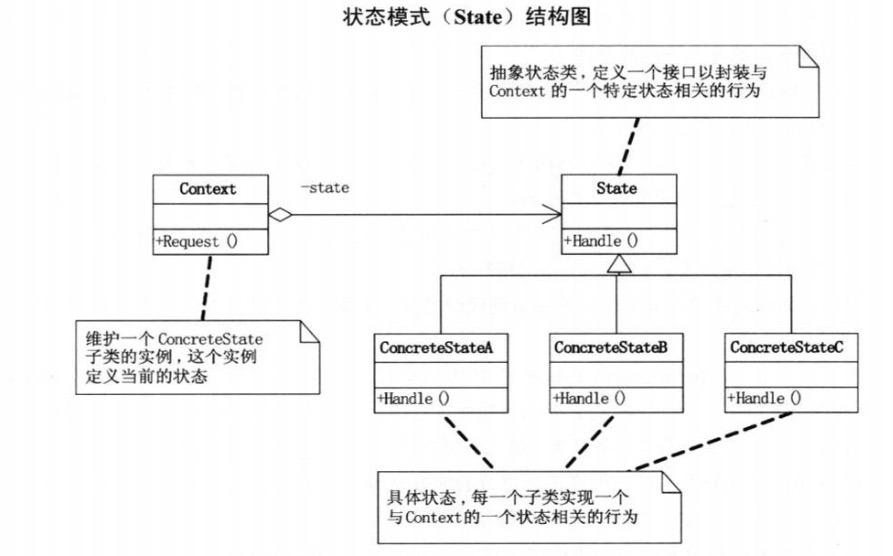状态模式 当一个对象的内在状态改变时允许改变其行为,这个对象看起来像是改变了其类。(DP)
当我们的代码中有这样的表达时,是不好的。
def myFunc():
if x > 90:
print "a"
elif x > 80:
print "b"
elif x > 70:
print "c"
elif x > 60:
print "d"
else:
print "e"因为 Long Method 可能是坏味道。
方法过长,且有很多的判断分支,就意味着它的责任过大了。无论是任何状态,都需要它改变,这实际上是很糟糕的。
上UML图
状态行为的好处就是,将与特定状态相关的行为局部化,并且将不同状态的行为分割开来。
将各种状态逻辑分割到子类之间,减少互相的依赖。

py-pattern 项目里面关于状态模式的例子不可谓不经典。
from __future__ import print_function
class State(object):
"""Base state. This is to share functionality"""
def scan(self):
"""Scan the dial to the next station"""
self.pos += 1
if self.pos == len(self.stations):
self.pos = 0
print("Scanning... Station is", self.stations[self.pos], self.name)
class AmState(State):
def __init__(self, radio):
self.radio = radio
self.stations = ["1250", "1380", "1510"]
self.pos = 0
self.name = "AM"
def toggle_amfm(self):
print("Switching to FM")
self.radio.state = self.radio.fmstate
class FmState(State):
def __init__(self, radio):
self.radio = radio
self.stations = ["81.3", "89.1", "103.9"]
self.pos = 0
self.name = "FM"
def toggle_amfm(self):
print("Switching to AM")
self.radio.state = self.radio.amstate
class Radio(object):
"""A radio. It has a scan button, and an AM/FM toggle switch."""
def __init__(self):
"""We have an AM state and an FM state"""
self.amstate = AmState(self)
self.fmstate = FmState(self)
self.state = self.amstate
def toggle_amfm(self):
self.state.toggle_amfm()
def scan(self):
self.state.scan()
# Test our radio out
if __name__ == '__main__':
radio = Radio()
actions = [radio.scan] * 2 + [radio.toggle_amfm] + [radio.scan] * 2
actions *= 2
for action in actions:
action()例子是这样的,有一个收音机,可以调到AM或者FM的状态。并且每个状态都有相同的方法,就是在特定频段间扫描。
不同的是,AM和FM扫描的频段是不同的。
于是有一个状态基类和他的两个子类AM和FM,他们都有的方法在基类中,不同的在子类中。
改变他们状态,就直接改变了实现。
以下是输出:
### OUTPUT ###
# Scanning... Station is 1380 AM
# Scanning... Station is 1510 AM
# Switching to FM
# Scanning... Station is 89.1 FM
# Scanning... Station is 103.9 FM
# Scanning... Station is 81.3 FM
# Scanning... Station is 89.1 FM
# Switching to AM
# Scanning... Station is 1250 AM
# Scanning... Station is 1380 AM这个例子棒极了。
于是我马上在我的代码中实现了一个。
需求是这样,前端有个选项,是判断是找所有的信息,或者是单个类别的信息。这两者的区别主要就在数据库查询语句的差别。
按照原来的实现,我至少有四个地方需要用到判断。于是我改成了状态模式。
上代码
class State(mongoBase):
class totalState(State):
def __init__(self, app):
super(totalState, self).__init__()
self.app = app
def toggle_changeParent(self):
self.app.state = self.app.specialState
def run(self, start_time, end_time):
#: for user info
# for register
pipeline = [
]
# for order
pipeline = [
]
# get user register and common user from different platform
#: Step 2: get order and deal info
# get all new or common user
for num, x in enumerate([newUserList, CommonUserList]):
pipeline = [
]
self.getOrder(pipeline, num)
pipeline = [
]
self.getDeal(pipeline, num)
return returnStaff
class specialState(State):
def __init__(self, app):
self.app = app
class userMachine():
"""
A Calc new/old user info Machine, it has an AllParent/SpecialParent switch.
"""
def __init__(self,start_time, end_time):
"""
we have an total state and specialParent state
"""
self.totalstate = totalState(self)
self.specialstate = specialState(self)
self.state = self.totalstate
self.start_time = start_time
self.end_time = end_time
def toggle_changeParent(self):
self.state.toggle_changeParent()
def run(self):
self.state.run(self.start_time, self.end_time)
if __name__ == '__main__':
start_time = '2015-08-22 00:00:00'
end_time = '2015-08-23 00:00:00'
app = userMachine(start_time, end_time)
app.run()只留下了代码骨架。
大量的mongo 聚合的pipeline都留到了子类里面,只要专注于定定不同的子类就可以了。即使下次做修改也十分便利。
